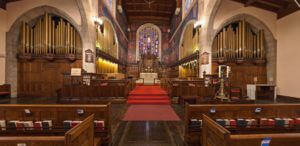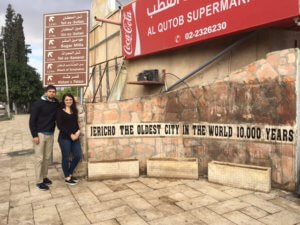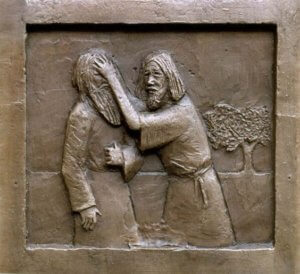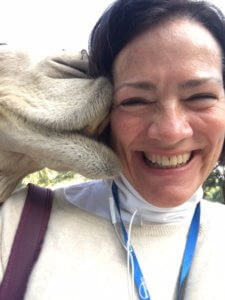But Now I See
 Maybe it’s my aging eyes, maybe it’s the mask and the foggy glasses, maybe it’s the dimmer light inside the church — or maybe it’s this microphone headset that gets tangled up in my glasses as I try to take off my mask… I don’t know what’s causing it, but I don’t see all that well these days. Words are blurry, especially the small grey print of my well-loved — and admittedly coffee-stained — prayer book, and especially inside the church, where it’s not as bright as it is outdoors. It’s just difficult to see.
Maybe it’s my aging eyes, maybe it’s the mask and the foggy glasses, maybe it’s the dimmer light inside the church — or maybe it’s this microphone headset that gets tangled up in my glasses as I try to take off my mask… I don’t know what’s causing it, but I don’t see all that well these days. Words are blurry, especially the small grey print of my well-loved — and admittedly coffee-stained — prayer book, and especially inside the church, where it’s not as bright as it is outdoors. It’s just difficult to see.
And it’s more than just my eyesight that has changed. My feelings — how I perceive things — may have changed also. Has anyone else noticed these differences during COVIDtide? Our feelings — how words or events land with us — or affect us — can be different too. For example the social distance of the pandemic can make us feel isolated and alone, even if we are not. And it can seem that sorrows or events happen to us with purpose and intent, rather than affect us because we love and are connected to our community. Or the joy and relief with our new vaccinated freedoms — careful, masked and vaccinated freedoms, that is — can make us feel like everything is back to normal, when actually everything — even we — have changed.
Our Expectations Influence What We See
Our expectations can also influence what we see. When we expect to see things a certain way, we often do. We can follow traditions and practices — even in our beloved liturgy — and not remember to notice the parts that are difficult or jarring. The words, even as those memorized sounds and rhythms emanate from us like the beats of our own hearts, can become common — even rote — to us. We can recite our prayers and the psalms we love, and even the words of joy, radical inclusion, abject terror, deep sorrow, and unimaginable grace can roll off our tongues, without our full emotional engagement of each of those extremes because we don’t consciously see or hear them any more. And how about this — Can you really see others when they are masked? Can others see and know you when you are wearing your mask? A dear friend of mine will often say on the phone — Wait, wait! I can’t hear you. Let me run and get my glasses!! Yes that’s funny, and so is she — but I also really get the issue. There’s something about our sight that supports our understanding, and our relationship with the world.
Up to Jerusalem
Mark’s gospel today points to this kind of spiritual blurriness in the story of Blind Bartimaeus. The setting for today’s healing story is really important. Jesus and the disciples have left the Galilee and are now on their final journey together up to Jerusalem for all that happens next.
And just a note on going up to Jerusalem: Even though Jerusalem is South of the Galilee, we always go up to Jerusalem — first because Jerusalem is on top of Mount Sinai (also pronounced Mount Zion) and Mount Moriah. We also always go up to Jerusalem — no matter what direction we start from — because Jerusalem is the holiest city in the world for Jews and Christians, and the third holiest — behind Mecca and Medina — for Muslims.
 In today’s gospel, Jesus and the disciples have come down from the Galilee, where Jesus has healed another blind man in Bethsaida, and are traveling through the Jordan Valley until they reach Jericho. Jericho is way down low near the Dead Sea, and at 10,000 years old and almost 850 feet below sea level, Jericho is both the oldest and the lowest continually inhabited city in the world. So Jesus and the disciples have gone from the mountains and rolling hills of the Galilee down low, low into the Great Rift Valley that runs all the way down — through Tanzania and Malawi — into Mozambique.
In today’s gospel, Jesus and the disciples have come down from the Galilee, where Jesus has healed another blind man in Bethsaida, and are traveling through the Jordan Valley until they reach Jericho. Jericho is way down low near the Dead Sea, and at 10,000 years old and almost 850 feet below sea level, Jericho is both the oldest and the lowest continually inhabited city in the world. So Jesus and the disciples have gone from the mountains and rolling hills of the Galilee down low, low into the Great Rift Valley that runs all the way down — through Tanzania and Malawi — into Mozambique.
They’re far from the preaching, teaching, feeding, and everyday miracles they were doing around Capernaum. They’re in a liminal space way down in Jericho, where everything is different from the prophetic work they’ve been doing in Galilee. And they have not yet reached Jerusalem, the site of the Temple, where the priests and scribes hold fast to the ancient teachings and traditions. It’s only as Jesus and the disciples are leaving this low, liminal space in Galilee on their way up to Jerusalem, that they encounter Bartimaeus. It’s not all that surprising that Bartimaeus was waiting for Jesus when Jesus and the disciples came through Jericho. After all, there was really no other way in first-century Palestine — or even now, really — to go up to Jerusalem from the Galilee other than through the Jordan Valley and Jericho. It was the midway stop between the Northern Kingdom and Judah — where Jerusalem is — from the days of the kings.
Bartimaeus
 Interestingly, when we encounter Bartimaeus in Jericho — the low, liminal way station between Jesus’ Good News and ordinary miracles in the Galilee, and the ancient traditions of the Temple in Jerusalem — the text is clear that Bartimaeus was not born blind. He has lost his sight over time. The Greek word for Bartimaeus’s plea to Jesus — anabletho — is that he may “look up” — that is, recover his lost sight. He calls out to Jesus, Son of David, have mercy on me! When Jesus asked, What do you want me to do for you?, Bartimaeus replied immediately and simply, My teacher, let me see again. Mark’s gospel concludes: Immediately he regained his sight and followed him on the way.
Interestingly, when we encounter Bartimaeus in Jericho — the low, liminal way station between Jesus’ Good News and ordinary miracles in the Galilee, and the ancient traditions of the Temple in Jerusalem — the text is clear that Bartimaeus was not born blind. He has lost his sight over time. The Greek word for Bartimaeus’s plea to Jesus — anabletho — is that he may “look up” — that is, recover his lost sight. He calls out to Jesus, Son of David, have mercy on me! When Jesus asked, What do you want me to do for you?, Bartimaeus replied immediately and simply, My teacher, let me see again. Mark’s gospel concludes: Immediately he regained his sight and followed him on the way.
Aren’t we, after this long COVIDtide, kind of like Bartimaeus? Does a kind of spiritual blurriness keep us from really seeing, and feeling, our relationships with each other and with God? Are we sitting by the road on the way out of our pandemic crossroads, like Bartimaeus, waiting to ask Jesus to let us see — and feel — again after this long COVIDtide? How can we clear the fog from our glasses and sharpen our vision to notice, and to join in with, what God is doing at Emmanuel?
God Is Making All Things New
Our pledge campaign theme — God is making all things new — has special relevance for all of us at Emmanuel right here and right now, as we witness God’s re-creation in our midst every day. There’s our space collaboration with Newport Classical that makes possible their new year-round programming, our upgraded kitchen and new catering tenants, the Cub Scout pack that will begin meeting at Emmanuel November 1, and our new signs that proclaim Emmanuel’s new role in the community as a center of life and welcome.
Your vestry has worked on a new mission statement that describes who we are as the Emmanuel community in these times — We share our home, building a vibrant, loving community. The theme of our pledge campaign, God is making all things new, is a natural outcome of our community’s work of sharing and building our home. And there’s more! Our July Artist in Residence, Randy Elkins, has accepted the position of Director of Music and Events at Emmanuel, bringing his energy and vision to our community on a long-term basis next month.
Jesus asks, What do you want me to do for you? Let’s say, My teacher, let me see again. And then, with our sight restored, let us, like Bartimaeus, follow Jesus on the way, sharing our home, building a vibrant, loving community, as God is making all things new. Amen

Collect
Eternal God, we pray that we will make stewardship a way of life. We acknowledge you as the source of all we have and all we are.
Help us to place you, our loving Creator, first in our lives by becoming more prayerful, more focused on loving and caring for our families and our neighbors in need, and by becoming less preoccupied with material things.
Help us to hear your call to be good stewards, caretakers, and managers of all your gifts by sharing them for your purposes.
Help us make your priorities our priorities and to put our faith into action. Help us plan to “give back” the talents, treasures and time with which we have been blessed.
Help us plan to serve our church, our community, and our world with your gifts.
May we serve you and pray with a joyful spirit of mind and heart.
Amen.
Blessing of Gifts
Gracious and loving God, giver of all that is good and true and beautiful and life-giving. These cards represent our work and the special talents you have given us.
They represent our lives and our dreams. The pledges we make on them are only tokens of the many amazing gifts that you have given to us, and they are pledged in thanksgiving for all we have received, for all we have been inspired to be, for all we are challenged to become, in this place.
May they be the first fruits of all we have and not what we have left over, so that we may live out as closely as possible how you give to us. May we see them as our offering to you, sacred, holy, yet earthy and filled with possibilities. May we hold this image in our hearts and minds so as we watch our offerings each week come to your table, we can see our very selves being part of this offering. It is us we place before you on this table, living sacrifices to you. Amen.
Adapted from The Rt. Rev. Greg Rickel Diocesan Bishop Diocese of Olympia
